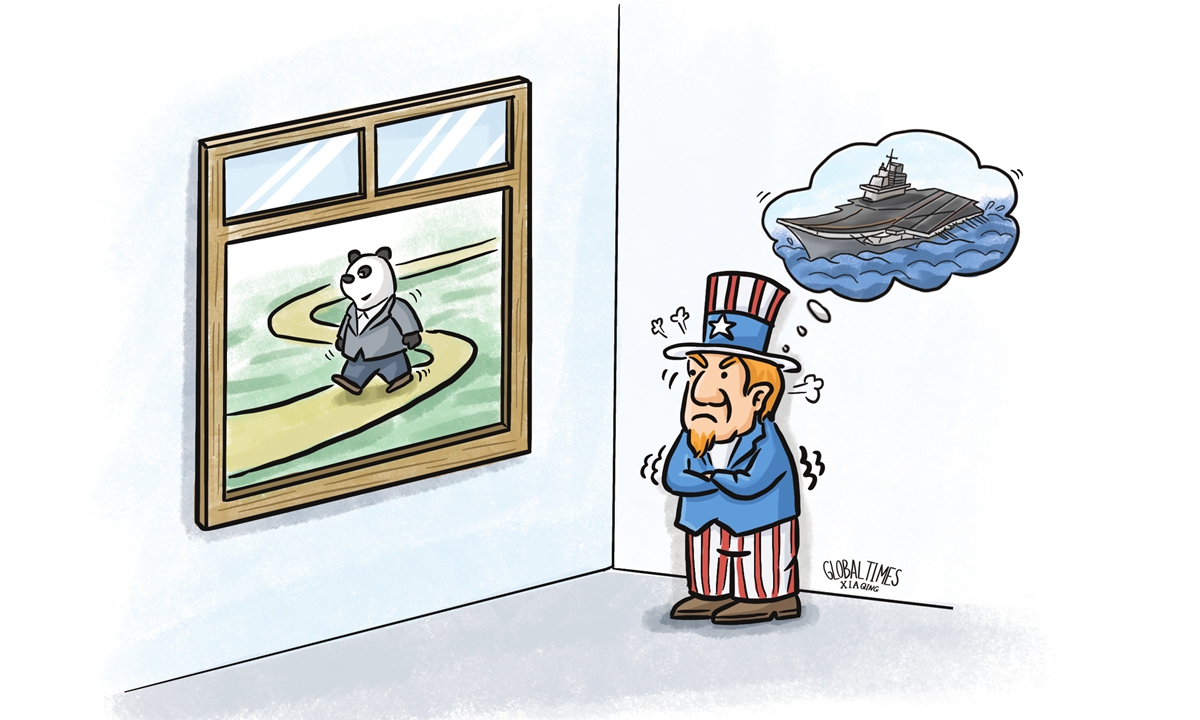With nearly 600 overseas military bases, US falsely claims China is 'building a new string of pearls'

Illustration: Xia Qing/GT
After The Wall Street Journal reported in December that China "intends to establish its first permanent military presence in the Atlantic Ocean" in the Central African country of Equatorial Guinea, US think tank Center for Strategic and International Studies (CSIS) issued a commentary suggesting that China is "building a new string of pearls in the Atlantic Ocean." In fact, the China-invested port construction in Bata, a city of Equatorial Guinea, is primarily to help the country's economic development. A port with greater capacity can be of more help to Equatorial Guinea's economy and employment.The training and support bases are needed to maintain regional peace and stability and ensure the safety of waterways accommodating peacekeeping and anti-terrorism operations. The only overseas support base belonging to China presently is in the East African nation of Djibouti, serving as both a training base for China's peacekeeping operations in Africa, and a support base for its Gulf of Aden escort missions.
Since the end of 2008, 39 Chinese Navy fleets have been sent to the Red Sea to conduct escort missions, and have been welcomed and recognized by informed countries. Not only has China been escorting its own merchant ships, it's also been providing security for many other countries.
The US, on the other hand, operates around 600 overseas military bases, with the aim of maintaining its global hegemony, targeting third parties in the regions by establishing military bases around rival countries.
Such installations cause significant damage to local society, environment and citizens, while posing a greater potential danger to regional security. The US, however, does not want to see China build even training or support bases overseas. Furthermore, they continue to pressure its allies to follow suit and support its containment of China.
Despite China's prudence in building such bases, more training and support bases are needed to maintain peace and China's overseas interests, since China has invested and will invest more in the African continent. This is against the US' wish that China be restricted within its own borders and that other countries refrain from cooperating with China, much less with China's military.
US President Joe Biden just signed a nearly $770 billion defense bill, the main purpose of which is to counter the so-called "China's military expansion." This is because the US is always speculating about China, based on its own hegemonic illusion which relies on the US dollar and its military power to acquire more colonies and set up more military bases. But the US forgets one thing: China, with peaceful development, has never encroached on others in history and will not do this in the future.
As early as 2004, US political researchers proposed the geopolitical hypothesis "string of pearls" which refers to a so-called "threatening" network of Chinese military and commercial facilities along sea routes extending from the Chinese mainland to Port Sudan in the Horn of Africa. Such a hypothesis is simply another "China threat" theory as the Chinese escort actions are commercial in nature. All the rhetoric indicates that some countries are truly ignorant about China's development, and they are always spinning an "invasive China" narrative by fabricating "China threat" theories.
What's more, even if an "Atlantic string of pearls" were built by China, it could neither connect to the Chinese soil nor pose a threat to any major power, and would have only a limited capacity to support and sustain itself. Compared with the US military bases around the world, China's overseas bases are constructed to ensure local security and interests.
When it comes to China, US mentality is always disordered. It finds China's rapid economic progress intolerable. But China must protect its national sovereignty, security and development interests, which include its overseas interests. The more overseas interests China has, the more it's necessary to build and maintain training and support bases nearby. Otherwise, it would be unable for China to respond quickly when its own interests are hurt.
The US poses serious threats to other countries through its global military base deployment, while it heads off others' normal operations abroad, for its own hegemonic benefits. By forbidding others to do what it is doing itself, the US puts forth another typically oppressive double standard.
The author is a Chinese military expert and TV commentator. opinion@globaltimes.com.cn
